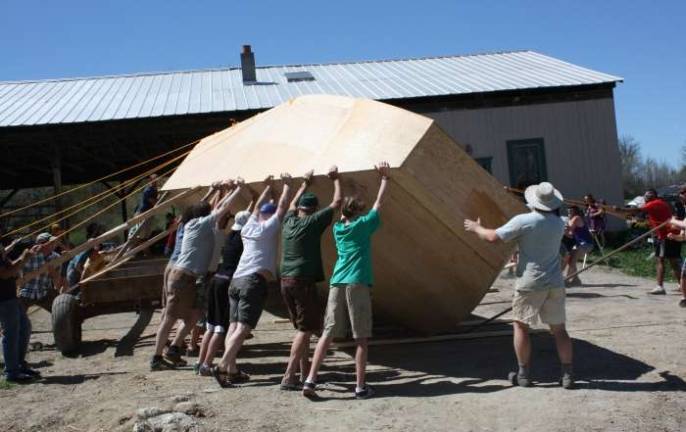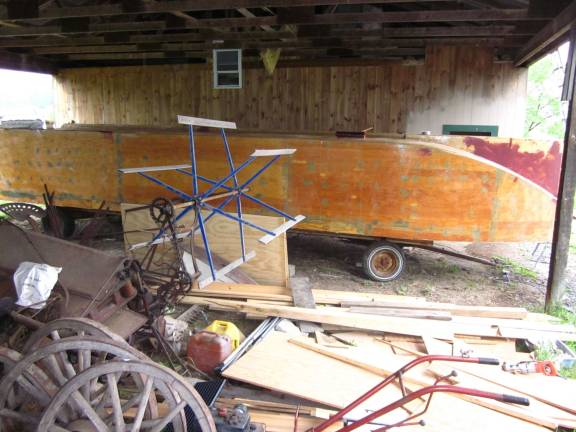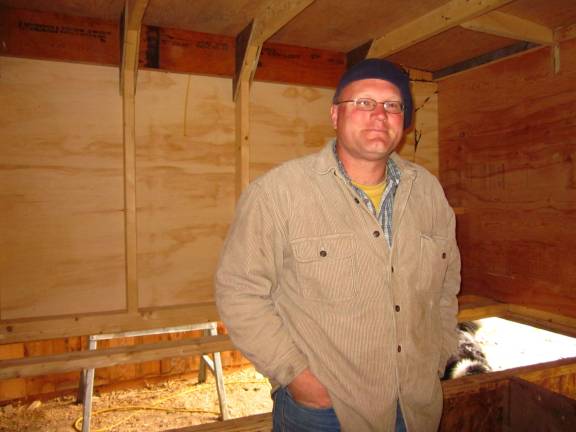Slow food? Depends on the wind



From atop a golden dome on the Vermont State House, Ceres, the Roman goddess of agriculture, looks out over the Green Mountains. A bit further west, near the shores of Lake Champlain, Ceres, a 36-foot flat bottomed barge, sits overturned in Erik Andrus’s barn.
Ceres is the first boat that Andrus has ever built, though he has been building with wood for 20 years. He couldn’t justify building a boat for recreation; it needed to have function and a coherent mission. For the past three years, Andrus has been building that idea in his head, and in March, he began construction on the sail-powered vessel that will transport shelf-stable farm goods from the Champlain Valley to New York City along the Hudson River.
With $31,000 raised from grants and a Kickstarter campaign, as well as a partnership with the Willowell Foundation, a non-profit that connects people with the arts, education, and the environment, Andrus’s vision is turning into reality.
Andrus wants to challenge the idea that waterways are an inconvenience in the fossil fuel age—moats that we have to drive around, bridge over, or tunnel under. Instead, Andrus sees the river as a conduit of life and trade. The Vermont Sail Freight Project is a functional approach to energy transition that is based on the historic relationship between the cities on the Hudson River and the Hudson River Valley farms that make their existence possible.
“We want people to think about their relationship with waterways in a different way,” Andrus said. “And what better way than to pick up your winter supply of potatoes and onions from a barge?” Andrus envisions customers picking up pre-ordered food from the boat as it stops at various ports along the Hudson River.
The boat will carry up to 12 tons of shelf-stable and non-perishable products such as apples, winter squash, dry beans, cabbages, wheat flour, onions, garlic, jams, salsas, pickles, and sauces. From Andrus’s own farm, white and brown rice, dry beans, popcorn, and potatoes are on the menu. On the return trip from New York City, Andrus hopes to connect the Champlain Valley to the wider world by bringing back fair trade, organic, and socially responsible products like sugar, chocolate, coffee, figs, olive oil, and sesame seeds.
Andrus has always found the idea of the voyage from source to mouth inspiring. He embarked on his first river journey with two friends after finishing high school, canoeing and camping down 200 miles of the Susquehanna River. He also once sailed from Penobscot Bay in Maine to the Long Island Sound and spends time sailing on Lake Champlain, even in bracing December air.
He wonders why we feel the need to ship non-perishable goods down the highway at 75 miles-per-hour. What’s the rush? Instead of burning through fossil fuels, why not enact positive change, create communities between farmers and consumers, and honor the integrity of a historic trading system?
Once it’s built, Ceres will launch in Lake Champlain, spending the end of the summer doing test runs before embarking on the full 300-mile journey from Ferrisburgh, Vermont, to Brooklyn in September.
The goal for the project is continuous service in 2014, with Ceres making runs from April to November, transporting everything from maple syrup in the spring to pumpkins and Christmas trees in the fall. (Ceres can hold 600 Christmas trees.) Andrus hopes that the project will be able to self-fund and employ a working crew.
“Given the level of enthusiasm that the project has received from all quarters—in Vermont and the Lower Hudson,” he said, “I think that we have a real shot.”